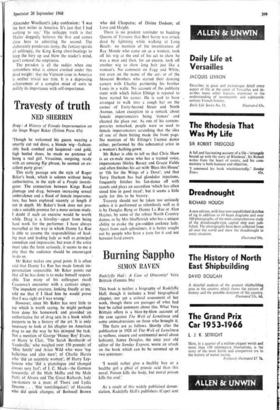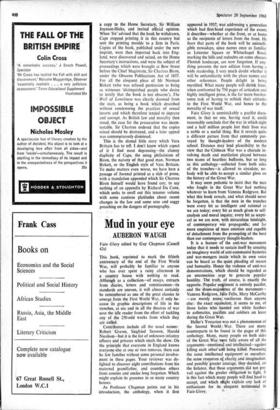Burning Sappho
. SIMON RAVEN
This book is neither a biography of Radclyffe Hall, though it includes a• brief biographical chapter, nor yet a critical assessment of her work, 'though there are passages of what had best be called comment about this. ,What Vera Brittaint, offers is a blow-by-blow account of the case against The Well, of Loneliness and sothe animadversions on those who brought it.
The facts are as follows. Shortly after the publication in 1928 of The•Wel1 of Loneliness (a verbose, sincere and sentimental novel about lesbians); James Douglas, the sixty year old editor of the Sunday Express, wrote an attack on the book which can be be summed up in two sentences: 'I would rather give a healthy boy or a healthy girl a phial of prussic acid than this novel. Poison kills the body, but moral poison kills the soul.'
As a result of this widely publicised denun- ciation, Radclyffe Hall's publishers (Cape) sent
a copy to the Home Secretary, Sir •William Joynson-Hicks, and invited official opinion. When `Ex' advised that the book be withdrawn, Cape stopped printing it in this country but sent the printing moulds to a firm in Paris. Copies of the book, published under the new imprint, were then imported back into Eng- land, were discovered and seized, on the Home Secretary's instructions, and were the subject of proceedings which were brought at Bow Street before the Chief Magistrate, Sir Chartres Biron, under the Obscene Publications Act of 1857. For all the eloquent pleas of Mr Norman Birkett (who was refused permission to bring as witnesses `distinguished people who desire to testify that the book is not obscene'), The Well of Loneliness was clearly doomed from the start, as being a book which described without condemning the practices of sexual inverts and which therefore tended to deprave and corrupt. As British law and morality then stood, the case for the prosecution was incon- testable. Sir Chartres ordered that the copies seized should be destroyed, and a later appeal was contemptuously dismissed.
This is the dismal little story which Vera Brittain has to tell. I don't know which aspect of it I find most depressing—the clumsy duplicity of Cape, the smug philistinism of Biron, the naivety of that good man, Norman Birkett, or the English style of Vera Brittain. To make matters even worse, we have here a passage of Juvenal printed as a slab of prose, with a translation appended which Sir Chartres Biron himself would have found coy; to say nothing of an appendix by Richard Du Cann, which seeks to swell out this tenuous volume with some cautious platitudes about recent changes in the law and some sour and soggy preaching on the dangers of pornography.











































 Previous page
Previous page